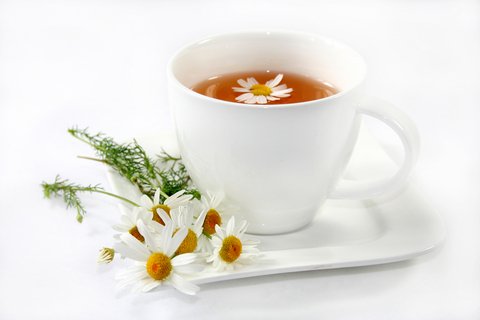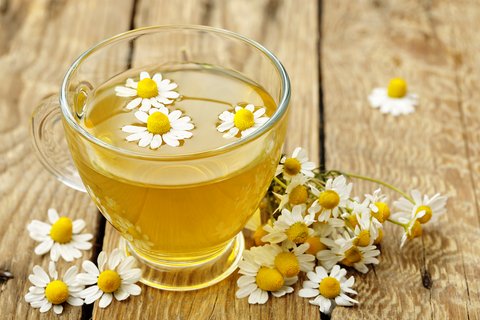Health Benefits of Chamomile
"Let food be your medicine and your medicine be your food. Each one of the substances in a person's diet, acts upon the body and changes it in some unique way, and upon these changes the whole life depends, whether in health, in sickness or convalescent."
Hippocrates 2 000 years ago.
 Chamomile Tea
Chamomile TeaWelcome to Home Remedies Haven, where we explore the gentle yet powerful world of natural healing.
Today, we're delving into the Health Benefits of Chamomile, a dainty flower with mighty health benefits that have been cherished across cultures and centuries. Revered for its calming properties, chamomile is more than just a soothing bedtime tea.
Chamomile is a versatile herb that offers a bounty of health advantages. From easing digestive discomfort to promoting restful sleep and reducing anxiety, chamomile stands as a testament to the strength found in nature's subtlety.
Join us as we uncover the myriad ways this beloved herb can enhance your well-being, proving that sometimes the most effective remedies are cultivated not in laboratories, but in the tranquility of nature's garden
Chamomile for Anxiety
Chamomile is widely regarded as an effective natural remedy for anxiety due to its unique combination of active compounds and soothing properties'.
|
Here are several reasons why chamomile is good for managing anxiety:
|

|
Chamomile for ADD - attention deficit disorder.

While there is limited direct research on chamomile specifically for Attention Deficit (ADD) or Attention Deficit Hyperactivity Disorder (ADHD), the calming and soothing properties of chamomile may indirectly benefit individuals with these conditions. Here are a few reasons why chamomile might be considered beneficial for those with ADD/ADHD.
- Its calming effects can be particularly beneficial for individuals with ADD /ADHD who often experience restlessness, difficulty relaxing, or trouble sleeping.
- Anxiety is common in individuals with ADD/ADHD. The anxiety-reducing properties of chamomile, mainly attributed to flavonoids like apigenin, can help alleviate anxiety, making it easier for individuals with ADD/ADHD to focus and manager their symptom's.
- Poor sleep quality and sleep disturbances are common issues associated with ADD/ADHD. Chamomile's sedative effects can help improve sleep quality, which is essential for overall symptom management in AS/ADHD.
- Chamomile is generally considered safe and well-tolerated by most individuals making it a potentially attractive complementary approach for managing mild symptoms associated with ADD/ADHD, especially in those seeking natural alternatives to conventional medicine.
Chamomile and Blood Issues
Chamomile is sometimes mentioned in the context of blood-thinning due to its natural compounds that may have anticoagulant properties.
However, it's important to note that the evidence supporting chamomile's role in blood thinning is not as robust as for other well-known coagulant substances.
Here's a closer look at why chamomile might be considered to have blood-thinning effects.
- Coumarins: Chamomile contains coumarins, a group of organic compounds that have anticoagulant properties. Coumarins can interfere with vitamin K, which is necessary for blood. This interference can potentially lead to a mild blood-thinning effect.
- Anti-inflammatory Properties can also contribute indirectly to its blood-thinning effects. Inflammation can lead to increased clotting activity in the blood, so reducing inflammation might help in maintaining a more balanced clotting process.
- Flavonoids: Chamomile is rich in flavonoids, such as apigenin, which have been shown to have various health benefits, including potential effects on blood circulation and clotting mechanisms. Flavonoids can help improve blood vessel health and reduce the risk of clot formation.
If you are considering using chamomile for its potential blood-thinning properties, it's essential to consult with a healthcare provider, particularly if you are already taking anticoagulant medications or have a condition that effects blood clotting
Chamomile for Muscle Spasms
Chamomile is often recommended for muscle spasms due to its natural anti-inflammatory and soothing properties, as well as its Antispasmodic Properties due to the flavonoids, which can help relieve muscle spasms.
- Antispasmodic Properties: Chamomile contains compounds such as flavonoids and terpenoids that have antispasmodic effects. These compounds can help relax muscles and reduce the occurrence of spasms by interfering with the mechanisms that cause muscle contractions.
- Anti-inflammatory Effects: Inflammation can contribute to muscle spasms and pain. Chamomile's anti-inflammatory properties can help reduce inflammation in the muscles, thereby alleviating spasms and discomfort.
- Analgesic Properties: Chamomile has mild analgesic (pain-relieving) effects, which can help reduce the pain associated with muscle spasms.
- Relaxation and Stress Reduction: Stress and tension can contribute to muscle spasms. Chamomile is well-known for its calming and relaxing effects, which can help reduce overall muscle tension, insomnia and the likelihood of spasms.
- Chamomile Bath: Adding chamomile tea, or a few drops of chamomile essential oil to a warm bath can help relax muscles and reduce spasms.

In Closing
While chamomile is generally considered safe, it's important to consult with a healthcare provider before using it, especially if you have underlying health conditions, or are pregnant, or are taking other medications.
This ensures that chamomile is appropriate for your specific situation and won't interact with other treatments you may be using
IMPORTANT NOTICE
Home Remedies Haven would like to reassure all the visitors to our site, that we respect your privacy and do not in any way sell personal information.
